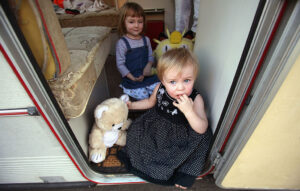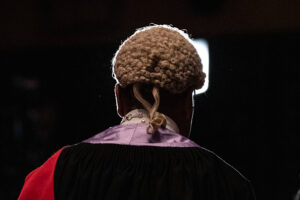Those London theatre lovers living south of Watford might not have noticed, but Scotland’s small but lively cultural sphere has recently become the latest contested territory in the UK’s unrelenting culture wars. It was revealed last week that a part-time literature officer working for Scotland’s arts body, Creative Scotland, contacted staff at an Edinburgh bookshop to advise them against stocking poet Jenny Lindsay’s forthcoming book, Hounded. Dr Alice Tarbuck did not make her views known in her professional capacity, it is understood, but nonetheless, that a member of staff working for the organisation responsible for supporting Scottish artists went out of her way to try undermining the career of a Scottish artist should ring alarm bells.
The apparently objectionable book promises to detail Linday’s experience of being accused of transphobia by fellow poets a few years back. After she called out a magazine for publishing a transactivist defending their call to harass and intimidate women at Pride, many of Lindsay’s former friends in the poetry scene turned against her.
For those well initiated in the dynamics of this conflict, and the specifics of Lindsay case, this is already pretty cut and dry. If you’re an intersectional trans-ally, fuck Lindsay. If you’re a gender critical feminist, she is basically Nelson Mandela.
That’s not the whole story though. There is another dimension here: the story of the petty and vindictive competing factions in small tight-knit creative scenes, and how their rivalries find expression as intense culture-war conflicts. There’s plenty to disagree with Jenny Lindsay about, but anyone working in the arts in Scotland already understands how running ideological battles both major and minor can dictate which of us are granted opportunities and which of us aren’t.
This latest stooshie erupted just days after Creative Scotland announced it was cutting the Open Fund — a pot of money ring-fenced for individual practitioners. The announcement has created an atmosphere of anxiety among artists, now less likely to take the morally correct position on Tarbuck’s gentle lobbying of bookshops, which was, at best, deeply unprofessional. This endemic insecurity, engendered by 14-years of austerity, also played a role in many looking the other way when Lindsay tumbled from atop the Scottish poetry community four years ago and speaks to the unwritten cultural commandments which must be adhered to if you wish to survive as a creator in the current climate. Thankfully, as an artist and writer who has never depended on Creative Scotland for much, I am not afflicted by this anxiety.
Since my twenties, I’ve been publicly criticising Creative Scotland for one reason: being tone-deaf to working-class creators. It’s a criticism common among artists from deprived backgrounds, rooted in our experience that the arts as well as the bureaucracies that oversee them favour artists, works and processes generally that reflect their own middle-class sensibilities. There’s a safeness, for example, in much of the work that gets supported, as well as a tendency among many in-vogue artists across the various disciplines to expressively dance around the real causes and conditions of the issues being tackled.
Granted, not everything has to be challenging or radical, and countless creatives from middle-class backgrounds are world-class practitioners who also deserve to be supported. But let’s face it: public funding is a game. A game that selects for those with the confidence, time and sense of entitlement to play it, and who possess an intuitive grasp of what will fly with the funders. A game that makes all those repeated references to the tenets of equality, diversity, inclusion and sustainability found on every Creative Scotland funding application somewhat ironic.
Today, pointed criticism of a public organisation like Creative Scotland, or certain factions situated around it, is now likely to be interpreted ungenerously by some as evidence of other unbecoming beliefs — that’s life in the culture war. It’s this palpable sense that by expressing an opinion on one issue — the unwarranted harassment of Jenny Lindsay — then you may be drawn unwittingly into the cultural tornado of fire that is the gender war and subsequently suffer damage to your fragile career.
Lindsay’s treatment has been made all the more odious by the highly personal, often intimate nature of the hounding. In comedy, rival acts take the piss out of each other on stage or down the pub. In hip hop, we have rap battles. In the poetry scene (once the faux-leather-clad notebooks are placed gently in the biodegradable vegan tote-bags), pathological resentments nursed over years are acted out remotely from behind veils of social justice concern. And Lindsay’s assailants have justified this to themselves as necessary because she is, in their ideological hivemind, an extremely dangerous woman whose beliefs represent a direct threat to the lives of vulnerable trans people.
Like Lindsay and her gender-critical feminism, trans people, advocating for their rights, also have the right to choose how best to do this. That said, when activists (like anyone else) veer so clearly into violent incitements against women they believe transphobic — which does happen — then no matter the justification, it must be called-out in the strongest possible terms. I didn’t understand why that was such a controversial thing for Lindsay to do back in 2020 and to be honest, I still don’t, but that’s what set this whole sorry poetry in motion.
Poetry is supported in a number of ways, whether through grants made available to individual artists, or to other organisations that employ, showcase, mentor or make some other use of poets. Those who remain close to the bosom of the arts body and its satellites are not exactly living it large, but they quickly develop an intuition for the sensibility it demands. One risk few artists will ever take is being seen to either criticise Creative Scotland or pass comment on any arts related controversy which could be construed as a lack of adherence to that sensibility.
As a result, many seem happy to tune-out this fiasco around Alice Tarbuck because it involves Jenny, who is bad, and has been brought to wider note through Right-wing publications such as the Mail and Spectator, which are also bad. This highly motivated reasoning means valid criticisms are often dismissed by artists based not on their lack of merit, but on who makes them and where they are published. In the case of Tarbuck, the hoo-ha is all just a bit of Tory unionist hokum and everything in the arts is fine, case closed. Well, it’s not fine and it’s time more of us said as much.
Jenny’s views are controversial and upsetting for some, yes, but they do not warrant a wholesale attack on her ability to make a living. While freedom of speech does not mean freedom from consequences, the main judges, juries and executioners in the kangaroo court appear to be her former contemporaries; artists whose work is underwritten in one way or another by Creative Scotland and has been for the best part of a decade.
They won’t picket outside your home or workplace; they don’t write to you seeking resolution, clarification or comment; they use their minor but prominent positions as cultural nodes within the Creative Scotland funded networks that comprise our arts and literary scenes, to drop their hints, comments and the occasional proverbial hand grenade on your ability to make an honest living.
Drawing a wage from a public body should place some constraints upon your conduct in public life, part-time or not. If people want to be activists, then go be activists. Stay away from influential roles in the civic sphere if you lack the self-control to behave professionally. Personal politics may, of course, inform your approach in the workplace, but there’s a line most public servants understand and try to observe. Granted, the behaviour of one staff member should not be overblown, but Tarbuck’s conduct speaks to a deeper cultural problem taking hold in parts of the arts which Creative Scotland must now confront if it has any hopes of surviving.
We need a new code of conduct for everyone working over there. Staff should be expected to keep their personal politics out of the process or risk being escorted off the premises. Funding judges should be obliged to declare any associations or prior history with applicants that may impair their objectivity. Similarly, a parallel code of conduct must outline new expectations of artists receiving funding. All recipients must be guided by an explicit directive that they will refrain from interfering with the work of other artists and their ability to earn a living while in receipt of public support, themselves. Such interference, wherever found, should result in the instant withdrawal of support, an order to repay all grants, and a lifetime ban from ever applying in future. One suspects such action may produce its own cooling effect in some overheated ideological conclaves where extremist behaviour appears relative to the level of state subsidy received.
Artists remain free, of course, to express their dislike of one another’s politics, but a signal must be sent to those who apply for financial support that public money is not a supplement to tide them over while they work to deny another artist’s right to earn a living. If hounding people out of the arts is your creative bag, do it on your own dime thank you very much.
Disclaimer
Some of the posts we share are controversial and we do not necessarily agree with them in the whole extend. Sometimes we agree with the content or part of it but we do not agree with the narration or language. Nevertheless we find them somehow interesting, valuable and/or informative or we share them, because we strongly believe in freedom of speech, free press and journalism. We strongly encourage you to have a critical approach to all the content, do your own research and analysis to build your own opinion.
We would be glad to have your feedback.
Source: UnHerd Read the original article here: https://unherd.com/




